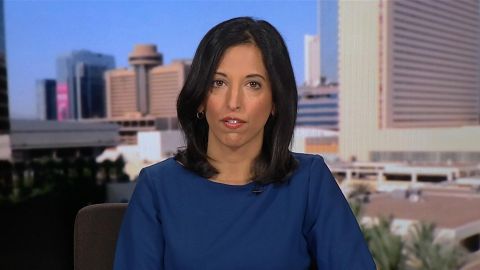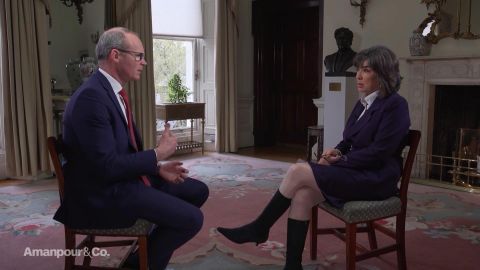Read Transcript EXPAND
CHRISTIANE AMANPOUR: How important is this moment for you and for your country?
SIMON COVENEY, IRISH DEPUTY PRIME MINISTER: Well, I think it is a significant moment. I mean, we are celebrating the centenary of the birth of an independent state, if you like, in Ireland, which was the painful and violent and difficult birth. But it’s one that has many decades later led to the modern diverse outward-looking island and Ireland that we see today, and that’s something that my generation of politician wants to protect and enhance and they are connections and relationships that we’re celebrating with the visit of Speaker Pelosi to Ireland.
AMANPOUR: So, I’m really interested because you say, you know, this independence, this peace, that erupted out of violence, you’re very, very committed to protecting. In other words, as we all know, the Good Friday Agreement between Ireland and Northern Ireland and Britain could be at risk because of Brexit. What has Speaker Pelosi been able to say to you that might assuage some of your fears?
COVENEY: So, to really understand why that’s a problem, you have to understand the Irish peace process and the conflict that led to the need for a peace process. And what I mean by that is that for many years, it was the physical border between Ireland and Northern Ireland that was a source of such friction. People were stopped and inspected by armed soldiers. It became a border where there was a lot of smuggling, there was a lot of gangland terrorism, and it became the symbol of the division of the Island of Ireland. And so, an all island economy has developed on the back of that peace process and on the back of joint E.U. membership that has, in many ways, reinforced the peace process.
So, let me give you some examples. Every year, half a million lambs from farms in Northern Ireland come south of the border to be slaughtered. Every year, almost 40 percent of all of the milk produced on Northern Ireland farms comes south of the border to be processed. Every year, tens of thousands of cattle are purchased by farmers and buyers in Northern Ireland south of the border and then taken north to be fattened and slaughtered. And that’s just agriculture. And that movement and that commerce has built relationships and has built normal trading environments that has allowed a peace process to bed in and has allowed neighbors to talk to each other as people who trade with each other as opposed to people who see themselves as coming from a different identity based on nationalism or unionism.
AMANPOUR: So, the underlying message is that absent all of this, you could go back to a lot of friction and there could, again, be the economic imperative or the trade imperative, what, for war?
COVENEY: Well, I mean, I think, you know, we need to be careful with how we describe the tensions around this. But certainly, we don’t want to see the peace agreement and what has come from that start to be reversed and go backwards.
About This Episode EXPAND
Christiane Amanpour speaks with Irish Deputy Prime Minister & Foreign Minister Simon Coveney about Brexit; and novelist Ian McEwan about his new book “Machines Like Me.” Michel Martin speaks with Anita Malik, a candidate for the House of Representatives whose background is in tech, about how she hopes to transform the traditionally conservative area.
LEARN MORE


